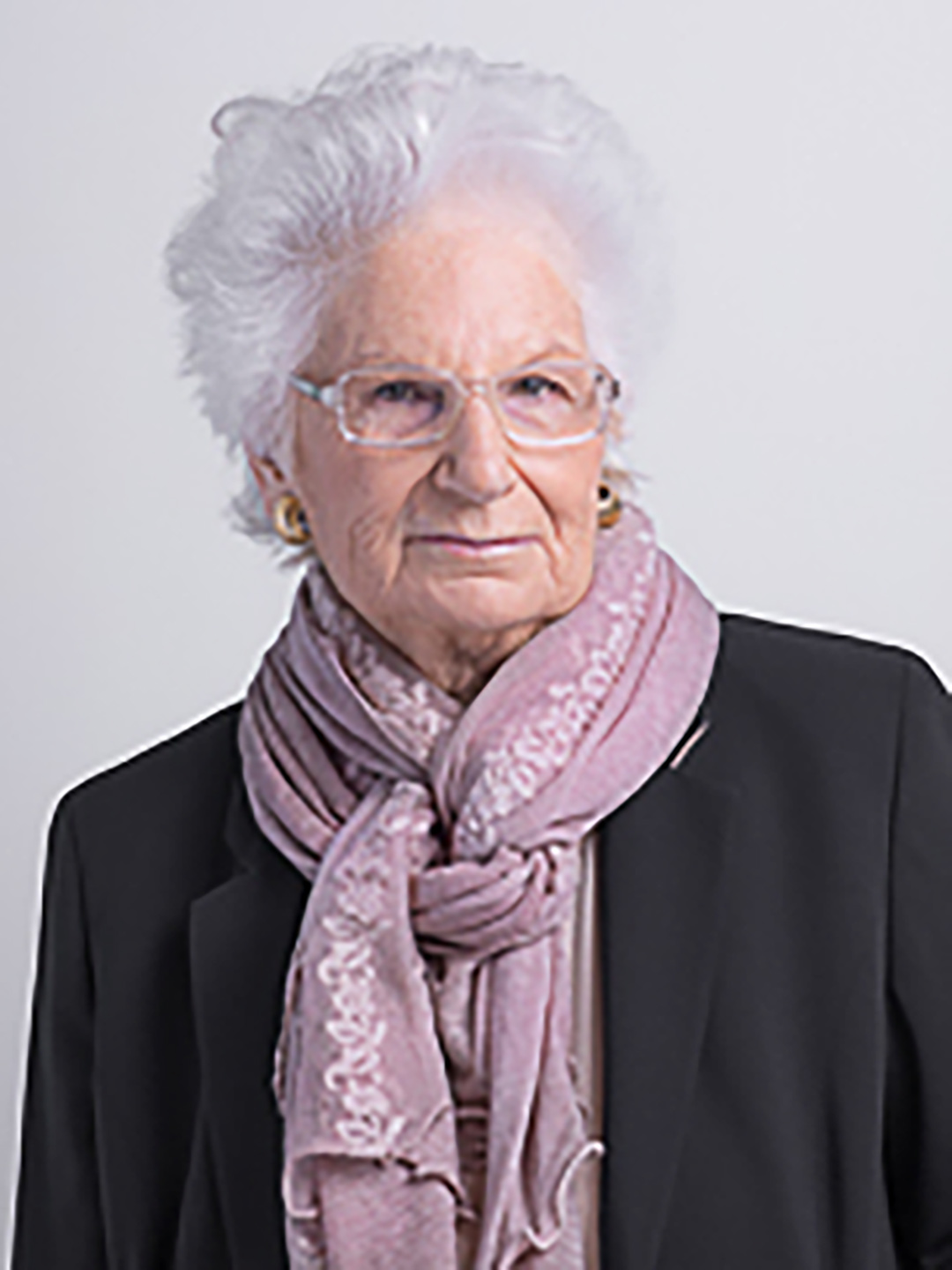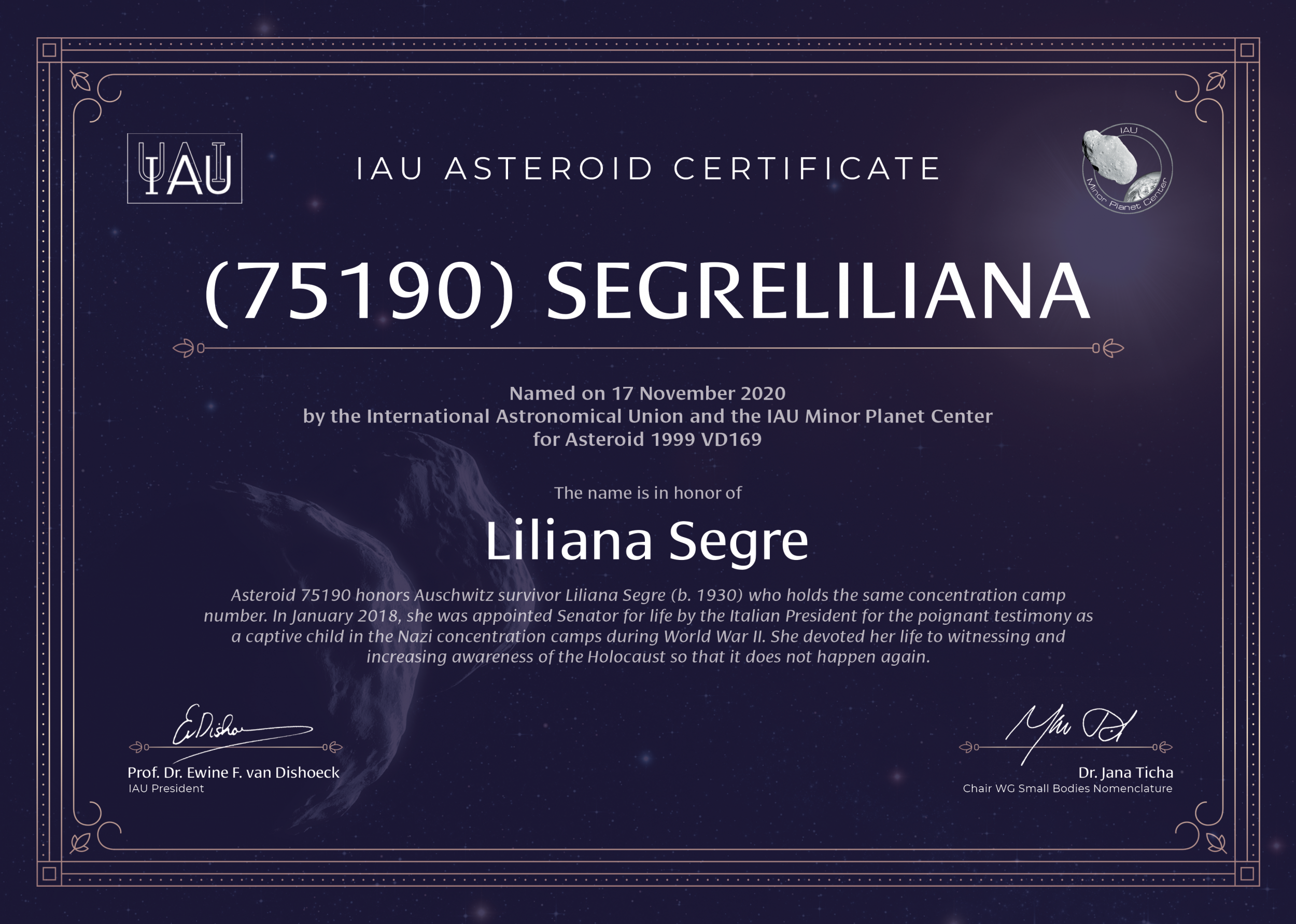Minor planet named to recognize Holocaust survivor for her efforts to combat intolerance
In 1943, 13-year-old Liliana Segre and her widowed father were deported from Milan, Italy, to the Nazis' Auschwitz concentration camp in Poland. Separated from her father, Liliana was selected to work in a munitions factory at the camp and tattooed with the number 75190. In 2021, 76 years after her liberation from Auschwitz, Liliana Segre was honored by the naming of minor planet 75190 as Segreliliana.

Segre was recognized by the International Astronomical Union (IAU), which is charged with officially naming celestial bodies, for her 30 years of speaking out about the intolerance and indifference that led to the Holocaust. Since 1990, she has delivered her message at conferences and school assemblies, contributed her voice to documentaries, and spoken with journalists, all with goal of educating people about the results of unbridled and unheeded prejudice, in her case anti-Semitism.
The naming of a minor planet is a consequential process. When an astronomical object that appears to be a minor planet is discovered, it is given a provisional number. After the IAU determines that the minor planet has exhibited a recurrent and well-determined orbit, the discoverer of the planet is invited to suggest its name and provide a rationale for the name. This proposed name is reviewed, judged, and approved by the 15-person Working Group for Small Body Nomenclature. The process can take substantial time because the IAU carefully vets suggested names, reviewing the justifications for them so that names are meaningful and not merely personal aggrandizements.
In 1999, Lincoln Laboratory discovered the minor planet, later numbered 75190, through the Lincoln Near-Earth Asteroid Research (LINEAR) program, which has been operated to discover minor planets, and especially near-Earth objects, since 1995. Minor planet 75190 was officially numbered in June 2011, receiving that number in sequence as the 75190th minor planet officially discovered. In 2019, Italian astronomer Paolo Molaro realized that the IAU-designated number for this discovery matched the concentration camp tattoo of Liliana Segre, who had become quite notable for her public work to combat intolerance in society. In a 2019 email to Grant Stokes, head of the Laboratory's Space Systems and Technology Division and principal investigator for the LINEAR program, Molaro advocated the submission of a request to the IAU that minor planet 75190 be named Segreliliana in Segre's honor.
"We receive quite a large number of requests to name minor planets that we have discovered, and we have been very careful to use our rights appropriately. Most of the minor planets that we have named have been under the Ceres Connection program that honors students who have excelled in national and international science competitions and their teachers or mentors. In addition, we have in cooperation with asteroid-sample missions named several minor planets that have been targets for those missions. Paolo's request was quite different, but we judged it compelling, so we made the official request as the discoverer to the IAU in 2019," Stokes says.
While it took the IAU less than two years to officially approve Segreliliana as the name for minor planet 75190, it took Segre almost 45 years after her liberation before she could talk about her experiences in the concentration camp. In a 2020 interview with Euronews, she explained that when she returned to Italy as a 15-year-old survivor, she found that it was too difficult for her to relive those experiences and too difficult for others to face the reality of the Holocaust. She is quoted by Wikipedia as saying, "Nobody understood me, I was the one who had to adapt myself to a world that wanted to forget the painful events that had just past, that wanted to start again, eager for fun and carefree." Her husband, Alfredo Belli Paci, himself a survivor of the concentration camps must have understood her silence. She noted in her Euronews interview that for many years she had not shared the Auschwitz experiences even with her three children.
On January 19, 2018, the 80th anniversary of the Italian Racial Laws, the President of the Italian Republic Sergio Mattarella appointed Segre as a Senator for Life for "outstanding patriotic merits in the social field." Her first legislative act was to propose the establishment of a Parliamentary Control Commission on racism, anti-Semitism, and incitement to hatred and violence that is based on racial or religious grounds. On October 30, 2019, the Italian senate approved and instituted such a commission. In the next month, Segre was the target of anti-Semitic postings on social media, an onslaught that reached 200 hate messages in one day. Subsequently, she needed to be put under police protection.
For this special naming, the IAU generated and delivered, along with a note from the IAU president Ewine F. van Dishoeck, a certificate to commemorate the naming and for presentation to the honoree. The certificate reads: "Asteroid 75190 honors Auschwitz survivor Liliana Segre (b. 1930) who holds the same concentration number. In January 2018, she was appointed Senator for life by the Italian President for the poignant testimony as a captive child in the Nazi concentration camps during World War II. She devoted her life to witnessing and increasing awareness of the Holocaust so that it does not happen again."

In replying to Dishoeck, Segre thanked the IAU for the honor, writing that she loved stars and quoting Dante, "E quindi uscimmo a riveder le stele" (And therefore we went out to see the stars again). This reference to stars harkens to Segre's autobiography titled Until My Star Shines, which relates how Segre distanced herself from the despair at Auschwitz by visualizing her fate as tied to a star, telling herself she would stay alive while her little star shone.
Segre has pretty much retired from public speaking engagements. While she has been honored not only with the status of Senator for Life but also with several honorary university degrees, her name will forever shine as part of the solar system, perhaps not as her star but as a minor planet.